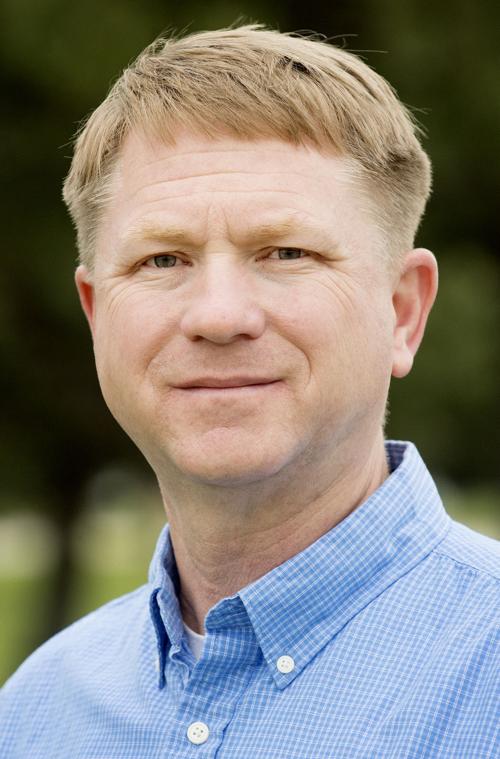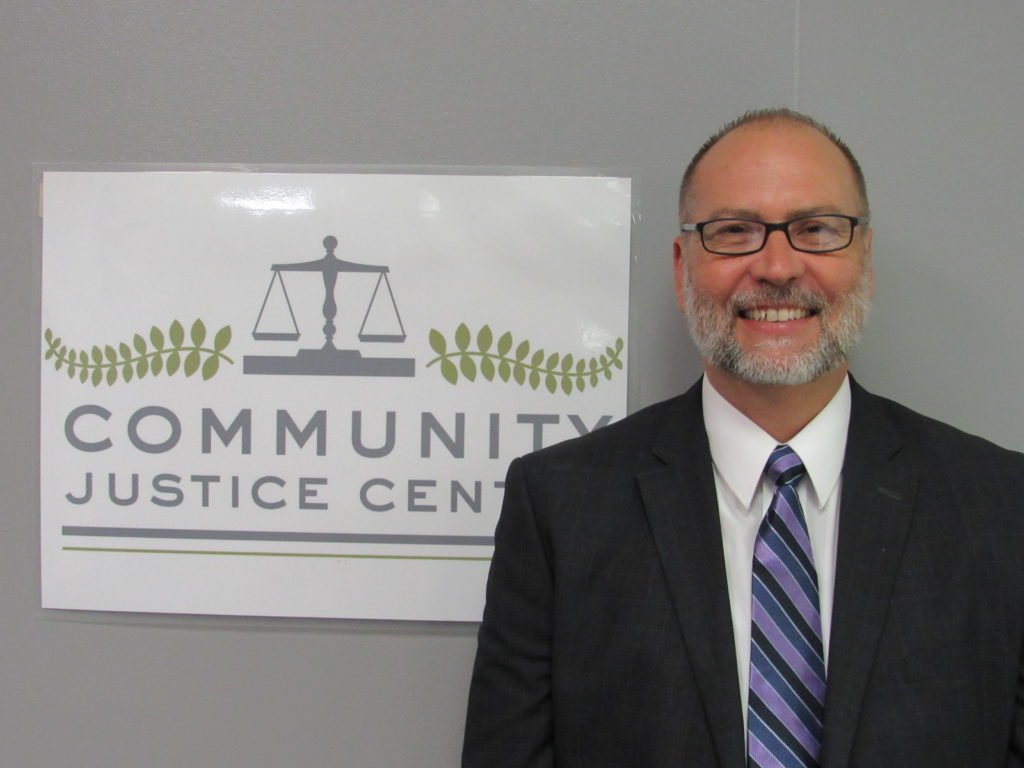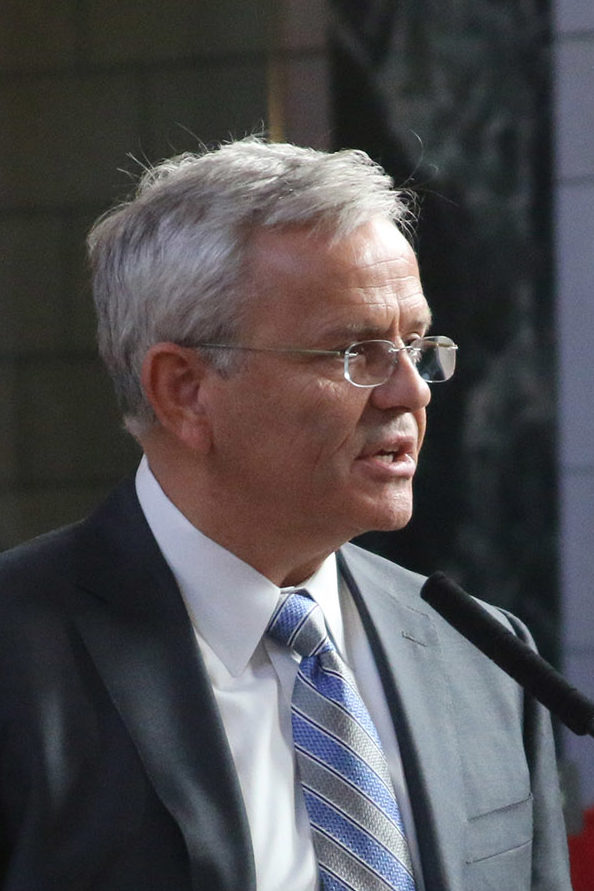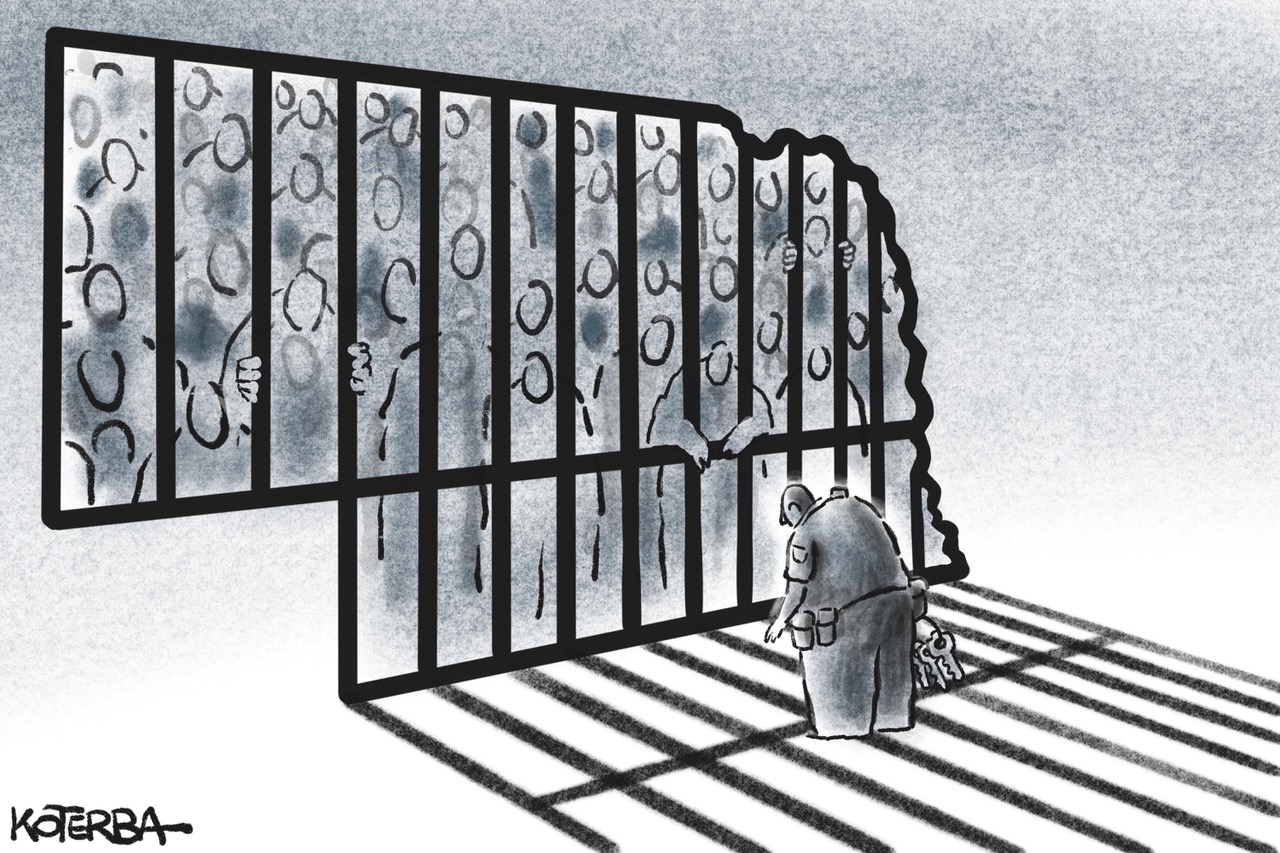In the minutes before 5 a.m., a group of Nebraska correctional officers arrive at the Omaha Correctional Center, a few miles east of downtown.
They go inside, clock in for a 12- to 16-hour shift, and then walk back out the way they came.
In the prison parking lot, a pair of idling vans wait to take them to the Tecumseh State Correctional Institution. It’s a 72-mile drive that clocks just shy of an hour and a half.
These Omaha correctional officers boarding vans in the darkness have become crucial to the continued operations of the long-overcrowded and now wildly understaffed maximum-security prisons, Tecumseh and the Nebraska State Penitentiary, that combined house nearly 2,400 inmates, including those serving life sentences and awaiting execution on Death Row.
The officers have become so essential that the state is willing to pay them for the three-hour round trip spent chatting or napping in a van — one part of ballooning overtime payments which now cost taxpayers millions each year.
Nebraska’s prison system has for years faced interlocked twin crises: Too many prisoners, and not enough employees to guard them.
The prison population has been over capacity since 1982, according to department data. By September 2021, the average number of prisoners reached 149.8% of the system’s design capacity. It’s projected to continue growing.
This crisis has consequences, say the nearly dozen former guards, former prisoners, family members, advocates and experts interviewed by the Flatwater Free Press.
It cost taxpayers $31 million in overtime payments in the past two years. It keeps prisoners locked in cramped cells for days at a time. It works a dwindling correctional staff to exhaustion.
It’s harder to stop assaults on prisoners and staff, harder to search for weapons and drugs, and more likely that entire prisons become powder kegs, experts said.
“It’s one thing to have a staffing issue. It’s one thing to have overcrowding,” said Dan Pacholke, former secretary of the Washington State Department of Corrections. “It’s a whole other challenge to have them both going on at the same time and at a very high level. Prison crowding and staff shortages are two indicators that a system is in trouble.”
In the past decade, the Nebraska Department of Correctional Services’ annual overtime spending nearly tripled. It reached $15.7 million in 2020 — the most spent on overtime across all state agencies, according to the most recent State Personnel Almanac.
A public records request revealed that in 2021 the state again spent more than $15 million on overtime payments to prop up Nebraska’s understaffed prison system. This time, nearly $5 million of that spending came from federal COVID relief funds.

And overtime is about to jump again: A new contract for correctional officers boosts salaries — a move state leaders think will eventually help recruitment and retention — but also bumps overtime pay from time-and-a-half to double.
“From here until June, it’s going to be such a significant dollar amount for overtime,” said Doug Koebernick, inspector general of the Nebraska Correctional System. “I think we’re going to get blown away.”
But the problem goes beyond money. The state’s overcrowded, understaffed maximum-security prisons create serious problems for both prisoners and the people paid to guard them.
FOR GUARDS, PANIC ATTACKS AND THREAT OF VIOLENCE
Former correctional officer Laura Sanchez was working anywhere from 70 to 80 hours a week when she left the department in July 2021.
She’d get panic attacks on the way to work. The thought of another unexpected 16-hour shift filled her with dread — 16 hours keeping an area secure as prisoners yelled and threatened her with sexual violence. Four years before, she had been working so much mandatory overtime at the State Penitentiary that she lost custody of her two children, Sanchez said.
“The judge told me that my job was too demanding,” she said. “He simply said, ‘I’m sorry that the state is doing this to you.’”
Sanchez quit and now works a more predictable schedule for State Patrol Capitol Security. She said she’s trying to regain custody.
Both the State Penitentiary and Tecumseh have been on 12-hour shifts since late 2019, to maximize what little staff they have. At that time, department of corrections director Scott Frakes said the longer shifts were “not a long-term plan.”
The department denied an interview request with Frakes for this story. A spokesperson instead shared a press release about the recent spike in correctional officer applications.

Only former correctional officers were willing to speak with the Flatwater Free Press — current employees deferred to the spokesperson, or said they feared retribution for speaking publicly.
Former Tecumseh guard Brooke Myers said whether she’d be released from a shift on time was always “a guessing game.” She knew night shift employees who would get assigned mandatory overtime almost daily.
Sometimes, the 19-year-old would be the only correctional officer assigned to a gallery, with 60 prisoners yelling from their cells at once.
“You have staff that are completely exhausted, mentally drained,” Sanchez said. “They’re getting slammed with overtime. They’re getting to the point where they’re putting staff at risk. If a huge staff assault were to happen, we wouldn’t have enough staff to cover that.”
A 2018 University of California Berkeley study found that 1 in 3 California correctional officers had experienced at least one symptom of post-traumatic stress disorder.
In Nebraska, correctional officers described a “continual sense of fatigue” and worried about the impact of overtime on their wellbeing, according to a 2021 report by Koebernick’s office.
The COVID-19 pandemic made the job even riskier. In a state with record-low unemployment, correctional officers are finding better paying, less risky opportunities elsewhere, Pacholke said.
“I would have stayed with the department,” Myers said. “But I am wanting to actually have a career that I know I can do long-term. There’s no way I’d ever be able to do this long-term, it’s just too taxing.”
Myers spent most of her eight months with the department being bused from Omaha to Tecumseh every morning at 5 a.m. She watched co-workers like Sanchez struggle to balance mandatory overtime shifts with raising children at home.
Often, correctional officers don’t find out they’re working a 16-hour overtime shift until 30 minutes before they had expected to leave, both Myers and Sanchez said.
Between a 16-hour shift, commuting to and from the prison, eating dinner and showering at home, Sanchez said she averaged about five hours of sleep between shifts.
The corrections officers driven in vans from Omaha to Tecumseh and the State Penitentiary are technically barred from sleeping on the drive — if there’s an accident, everyone on board must write an incident report. But it isn’t unusual for the passengers to squeeze in a nap, Myers said.
The more vacancies the department faces, the more overtime those left are forced to work. An increasingly exhausted correctional staff creates safety risks for a job that demands high levels of attention, experts said.

“For a corrections officer, once they get into this vortex…it makes it impossible for them…to remain vigilant, to think not only about the safety of themselves and their colleagues, but also of all the detained people that they’re there to ensure the custody of,” said Dr. Homer Venters, former chief medical officer of the New York City jail system.
At the State Penitentiary, tension between staff and inmates felt “so thick you could literally choke on it,” Sanchez said.
“A lot of inmates…now realize that this is not a staff-caused problem,” Sanchez said. “A lot of them have grown to understand that we don’t like it as much as they do. And I can’t say I blame them for being angry. I would get angry too.”
LOCKED-DOWN PRISONERS ‘LIKE RATS IN A CAGE’
On a normal day, prisons teem with movement. Groups of men walk from their cells to the yard to the cafeteria. They visit the library or chapel. They perform jobs around the prison through Cornhusker State Industries.
But during lockdowns — sometimes scheduled, sometimes unexpected — that grinds to a halt.
The Diagnostic and Evaluation Center puts four to a two-man room. Designed to hold 160 people, the Lincoln prison where new prisoners start their sentences has been stretched to more than triple its design capacity. It now houses some 500 men.
Those who can’t fit in cells are kept in large rooms, sleeping on toboggan-like plastic cots — essentially bins on the ground with a thin mat inside. Cots even fill the prison gym.
During lockdowns, men are stuck in two extremes: isolated in a tiny room with three other cellmates, or one of hundreds in a tightly packed dorm.

Ryan Shannon, who was formerly incarcerated at the State Penitentiary in 2019, said he was housed in a similar dorm, where 200 men slept in a room filled with four rows of plastic cots that could be stacked up during the day.
Lockdowns made the dorm feel “like rats in a cage,” he said.
Debra Johnson said her son, another Nebraska prisoner, spent two years bunking with three other men at the Diagnostic and Evaluation Center. The only view out was a tiny square window, perched so high that he could only see out of it from the top bunk or standing on his tiptoes. He’s 6-foot-5.
When he stood on his tiptoes, his view was another concrete building.
Her son is now at Tecumseh, one of the three prisons that moved under a regular three-day lockdown schedule in the fall to better distribute staff throughout the week.
As a consequence: Every Thursday night, the men at Tecumseh, Lincoln and the Diagnostic and Evaluation Center are locked in their cells or overcrowded rooms. The cells aren’t unlocked until Monday morning.
“When these lockdowns occur in response to staffing shortages, it represents a real downward spiral,” Venters said. “It does not fix any problems. It creates brand new problems.”
The mandatory lockdowns take a mental and physical toll, he said.
“This is just too much, Mom,” Johnson’s son, who requested anonymity because of safety concerns, told her over the phone one day. “Even if they’d get it down to two days, anything would help.”
It’s hard to exercise in cramped cells, not only because there isn’t space, but because then, prisoners and their cellmates would have to live with the lingering stench — weekend lockdowns mean only being let out for about 20 minutes the whole weekend for a quick shower.
It isn’t unusual for prisoners to resort to makeshift baths, “like a bird bath using the sink,” Koebernick said.
Prisoners told Myers that they were having to deal with their personal mental health challenges and their cellmates’ as well. Locking down Thursday nights was always a struggle, because the men knew what they were in for the next three days.
“Imagine sitting in a closet for that long,” Johnson said. “These three days are just killing these guys.”
Weekend lockdowns mean disruptions to medication schedules, including psychiatric and sleeping medications. Time for programming and classes gets limited to four days, assuming the facility has enough staff to accompany instructors and volunteers.
The men at Tecumseh, Diagnostic and Evaluation and the Lincoln Correctional Center — who together comprise roughly 40% of Nebraska’s male prison population — can’t see visitors on the weekends. That’s when most working families have time off and can make the trip.
There’s little time for phone calls home. Prisoners who have jobs in the building end up working fewer hours, missing out on the meager salaries that come with those jobs.

“It’s an additional punishment on the individuals through no fault of their own,” said Rick Carter, program and operations manager for the Community Justice Center, a nonprofit that offers programming in the prisons. “Residents of facilities don’t control staffing levels. They don’t control security levels. But they face the consequences of those things.”
RELIEF ON THE WAY?
The state hopes the recent raises for state correctional officers will help recruit and retain staff, lowering the department’s reliance on overtime work to keep afloat and minimizing lockdowns.
Starting wages for corporals and caseworkers went from $20 an hour to $28, with double pay for overtime hours.
The raises have already impacted recruitment: 630 people have applied for corporal positions since the announcement on Nov. 10, the department said in December. The five weeks prior, the department had received 162 applications.
The change also seems to be slowing the exodus that had already drained the department, and bringing in higher quality applicants, Koebernick said.
“That’s a really good sign,” Koebernick said. “More importantly, what we’re hearing is that it’s giving staff out at the facilities hope that there’s relief on the way.”
The department will need a steady flow of new hires over the long term if it wants to meet appropriate staffing levels, he said. Meeting those staffing goals should decrease the number of needed overtime hours as well, said Sen. Steve Lathrop, chair of the Judiciary Committee.

The raises “demonstrated the significance of the problem we have found ourselves in,” Lathrop said. “These people deserve to be well paid for what they do. $56 an hour to work overtime? That’s not sustainable if that’s your business model and you don’t get to fully staffed.”
Corrections will need even more employees if the state decides to move forward with plans to build a new prison, one of the many corrections-related proposals on the table during the session of the Nebraska Legislature that began Jan. 5.
With new data analyzing the state’s prison system, the Legislature will weigh proposals to build or reform sentencing to shrink Nebraska’s prison population.
“Is it about keeping somebody in prison longer? Or is it about having them supervised when they leave? Somewhere along the way, we need to talk about that growth in population,” Lathrop said. “I think that’s going to be the question that Nebraska state government is going to have to address in the next year.”



5 Comments
Natalla,
Thank you for a well researched and informative article about living and working conditions in Nebraska prisons. I can’t say I enjoyed reading the article, but I’m glad I did. The information you shared opened my eyes about how inhumane and grim the situation has become. Nebraskans are better than this. I believe we must follow the lead of other states that are thinking outside of the box about prison reform.
Great job Natalia!!! I live in Illinois and have a brother in prison here and it is horrific!! Human beings should not be treated the way they are treated – no matter their alleged crimes. It’s truly SAD! Thank you for shedding light on this growing problem.
Thanks for your coverage . Please follow up with coverage of poverty and racism fueled pipeline. https://youtu.be/0xYztX8UnqE #outofomaha movie 🎥 Amazon prime
This is the type of in-depth reporting that can inform state policymakers’ decisions. Your reporting lets readers hear the voices we don’t often hear. Thank you for your good work.
This inhumane treatment of prisoners and staff needs to end. Much of the over crowding problem could be solved by releasing non-violent prisoners serving time for drug possession.